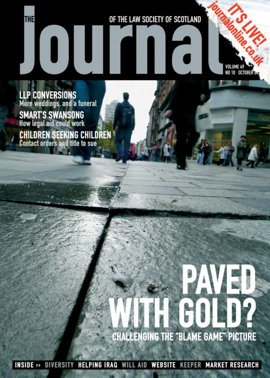Citizenship, society and solicitors

It’s been an eventful month which saw me attending the GBA Dinner, giving this year’s APEX lecture, chairing the Society’s Special General Meeting (SGM), visiting Shepherd+ Wedderburn and attending the opening of the legal year. Balancing presidential and work commitments meant that I had to miss faculty visits to Falkirk, Kilmarnock and MacRoberts, but Caroline Flanagan and Douglas Mill reported successful meetings. We are now organising visits for early next year so let us know if you would like the office bearers to visit your faculty.
I was delighted to give the second annual APEX lecture. This prestigious event gave me the opportunity to highlight the importance of the rule of law. This theme was also the focus in the plenary sessions of bar leaders in London for the opening of the legal year. Various speakers put real meat on the rule of law and the essential role lawyers have in upholding its tenets. In particular Louise Christian, an English solicitor with a notable human rights practice, described the extent to which the word “torture” had entered her vocabulary and the challenge posed to the rule of law by detention without trial.
In the APEX lecture, I emphasised the need to promote citizenship education and the opportunity it gives to highlight the balance of rights and obligations and promote good citizenship for young people. The rule of law demands that law is visible and accessible to the population. The Society has, through its support and involvement with the Young Citizen’s Passport and the Law in Schools project, done much to empower schoolchildren and inform them of the role, relevance and value of solicitors in society.
By the time you read this, the Queen will have officially opened the Scottish Parliament. I wish our parliament and parliamentarians well in their permanent home. By mid-September the Scottish Parliament had passed 79 Acts and 2,691 statutory instruments. Such legislative reform was impossible within the Westminster timetable and it is clear that the parliament can deliver on its objectives to modernise and improve Scots law. I pay tribute to all who contribute to the Society’s work on new legislation. The Executive and MSPs alike recognise and value the Society’s significant role in commenting on the practicalities. This is a true example of the Society giving effect to its dual role: promoting the interests of the Scottish solicitors’ profession where effective, relevant legislation best enables them to do their job and helps the Parliament make modern, workable laws for Scotland.
I have touched on the contribution lawyers make to society, and that leads me on to APEX and the Prince’s Trust, both organisations that make major contributions to modern Scotland. Both help young people to realise their potential, renew their self-confidence and re-establish self-belief. The APEX strapline “Starting work, stopping crime” adds a vital third component to that modern maxim “tough on crime, tough on the causes of crime”.
Rules to allow the registration of foreign lawyers were approved at the SGM, and the Society will now work with the Law Society of England and Wales to bring forward rules to facilitate multi-jurisdictional firms. It is a fact of “smart successful Scotland” that our top four firms’ fee income significantly exceeds the total spend on legal aid. The figures published by SLAB however demonstrate that many solicitors undertaking legal aid work do so simply as part of their calling to assist those in need of legal advice. In the context of access to justice it is a concern that whilst the media focus is on the top seven firms’ and advocates’ fee income, over half the firms in Scotland undertake less than £20,000 worth of legal aid work. Many will re-examine whether they can continue to provide a quality professional service on the fees paid where profit margins, particularly in civil work, are minimal. In comparative terms, the spend on legal aid at £146 million is modest, which is why we can only hope that the forthcoming publication of the strategic review will focus on access to justice issues for those in need of legal advice and representation.
I leave you this month with a quote from Lord Justice Mummery, the former EAT President in a decision issued last month, which raised a few smiles in the EAT:
“The legal materials on indirect discrimination and equal pay are increasingly voluminous and incredibly intractable. The available arguments have become more convoluted, while continuing to multiply. Separating the wheat from the chaff takes more and more time. The short snappy decisions of the early days of the industrial tribunals have long since disappeared. They have been replaced by what truly are ‘extended reasons’ which have to grapple with factual situations of escalating complexity and with thicker seams of domestic and EC law, as interpreted in cascades of case law from the House of Lords and the European Court of Justice.”
So there’s still plenty of work for solicitors!
Duncan Murray is President of the Law Society of Scotland
In this issue
- Citizenship, society and solicitors
- The well unfair state
- Litigation nation
- Best medicine
- Take a deep breath
- What title?
- Walk this way?
- Know your strategy
- e-quilibrium?
- The researchers
- Rights out of anarchy
- Political correctness or positive change?
- Steering clear
- How far can a board go?
- Major role for new tribunal
- The race is on (again)
- Planning a superhighway
- Website reviews
- Book reviews
- Single survey's lonely heart
- In harmony
- Clearing the path






